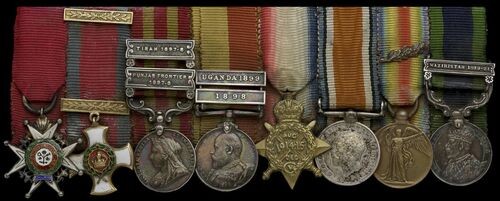
Auction: 23001 - Orders, Decorations and Medals
Lot: 291
The mounted C.B., D.S.O. group of eight miniature dress medals worn by Colonel F. S. Keen, C.B., D.S.O., 45th Rattray’s Sikhs
The Most Distinguished Order of the Bath, Military Division Badge, silver-gilt and enamel; Distinguished Service Order, G.V.R., gold and enamel; India General Service 1895-1908, 2 clasps, Punjab Frontier 1897-8, Tirah 1897-8; Africa General Service 1902-56, E.VII.R., 2 clasps, 1898, Uganda 1899, on an East and Central Africa 1897-99 riband; 1914-15 Star; British War and Victory Medals, with M.I.D. oak leaves; India General Service 1908-35, 1 clasp, Waziristan 1919-21, mounted court-style as worn, very fine (8)
The recipient's full-size awards sold in these rooms in April 2021, Lot 339 (Hammer Price £6,500).
C.B. London Gazette 3 July 1926.
D.S.O. London Gazette 14 January 1916.
Frederick Stewart Keen was born on 22 June 1874, the third son of Colonel Sir Frederick John Keen, K.C.B. Educated at Haileybury and Sandhurst, he was attached as a subaltern to the Royal Welsh Fusiliers in 1894, prior to being appointed to the 45th (Rattray's) Sikhs in the following year.
Having then witnessed active service with the Tirah Field Force in the Bara Valley operations of 1897-98 (Medal & two clasps), he was seconded for service in East Africa.
Arriving in Mombasa in March 1898, he took command of a company of the Uganda Rifles at Kismayu that July; he was subsequently actively employed in the Ogaden Expeditionary Force in Uganda until October of the same year (Medal & clasp), and was likewise actively employed during the 3rd Nandi Expedition in May-October 1900 (2nd clasp).
Keen departed Mombasa for India in May 1901 and became a Political Officer after being advanced to Captain in early 1903. It was in this capacity that he was mentioned in despatches for his supporting work in respect of operations on the North-West Frontier (London Gazette 14 August 1908, refers).
Having then graduated from the Staff College, Quetta in the class of 1909-10, he was advanced to Major in Rattray's Sikhs in January 1912. It was in this capacity that he first saw action in the Great War, albeit on attachment to the Indian Expeditionary Force sent to the defence of British East Africa in late 1914.
In January 1916 he delivered a lecture at Simla - 'The Campaign in East Africa'; a copy of his talk was subsequently published in the Journal of the United Service Institute of India and it makes for fascinating reading. The challenges of a determined enemy were one thing, but, as Keen was to relate, other local inhabitants were of equal concern:
'Apart from the active and enterprising foe, wild beasts frequently gave our patrols a lively time. Mounted parties had great difficulty in preventing their animals from being stampeded at night by prowling lions, and many a patrol was charged by rhinoceros. On one occasion a rhino charged alternately a British and a German patrol who were skirmishing north of the Tsavo river, and finally assaulted some Masai who were watching the contest and awaiting the result, killing one of them. Both patrols and the Masai retired, leaving the rhino in charge of the field… '
In concluding his lecture, Keen referred to the Germans as having - on the whole - 'played the game':
'I saw German doctors and nurses in Tanga hospital treating out wounded, black and white, just the same as our own. There were unfortunately instances of our wounded being shot by askaris, but there were also numerous instances where German officers saved our wounded from their own askaris.'
In addition to his award of the D.S.O., Keen was also mentioned in despatches for operations in the East Africa Force (London Gazette 30 June 1916, refers); such had been the prominence of his role in the campaign that he was invited to contribute to the official history of the campaign in the early 1930s.
Re-united with Rattray's Sikhs, Keen went on to witness further active service in Mesopotamia, gaining at least two further "mentions" (London Gazette 21 February and 5 June 1919, refer), in addition to participation in the Waziristan operations of 1921-22, as C.O. of the 15th Sikhs (Medal & clasp).
Latterly Commandant of the Small Arms School in India, he was placed on the Retired List in 1926, the same year in he was awarded the C.B. The Colonel settled at Seaton, Devon and died in August 1949.
Subject to 20% VAT on Buyer’s Premium. For more information please view Terms and Conditions for Buyers.
Sold for
£380
Starting price
£170




